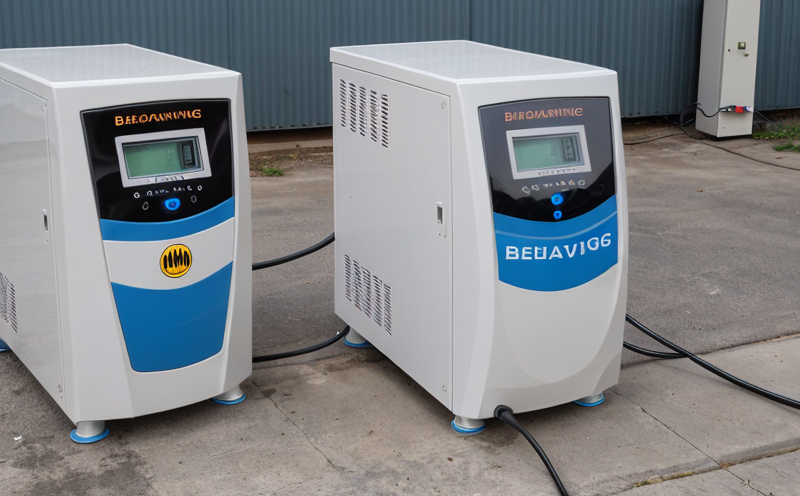UNE EN 62619 Charging and Discharging Testing of Industrial Lithium Batteries
The UNE EN 62619 standard is a critical tool for ensuring that lithium batteries used in industrial applications meet the highest safety, performance, and reliability standards. This test focuses on evaluating the charging and discharging behavior of these batteries under controlled conditions to ensure they perform reliably over their lifecycle.
Lithium batteries are widely used across various sectors such as automotive, electronics, medical devices, and renewable energy storage systems. Their ability to hold a charge for extended periods without degradation is paramount. The UNE EN 62619 standard provides a robust framework for testing the charging and discharging behavior of these batteries, which helps manufacturers ensure consistent performance and safety.
The test protocol outlined in this standard involves subjecting lithium batteries to specific charging and discharging cycles under controlled environmental conditions. This process allows engineers to monitor how the battery behaves over time, ensuring that it meets both industry standards and customer expectations. The results of these tests are essential for quality assurance, compliance with regulatory requirements, and continuous improvement in product design.
The UNE EN 62619 standard emphasizes the importance of accurate and repeatable testing to ensure consistent outcomes across different batches of batteries. This is particularly important given the wide range of operating conditions that industrial lithium batteries may encounter in real-world applications. By following this standard, manufacturers can develop products that are reliable, safe, and capable of delivering optimal performance over extended periods.
One key aspect of UNE EN 62619 is its focus on safety. The standard outlines specific procedures for ensuring that batteries do not overheat or become unstable during charging and discharging cycles. This includes monitoring the temperature, voltage, current, and other critical parameters throughout the test process. By adhering to these guidelines, manufacturers can help prevent potential hazards associated with improper battery handling.
The UNE EN 62619 standard also covers aspects such as capacity retention over time and cycle life under different conditions. Capacity retention refers to the battery's ability to maintain its initial charge after repeated charging and discharging cycles. Cycle life, on the other hand, measures how many complete charge-discharge cycles a battery can undergo before its performance starts to degrade significantly. Both of these metrics are crucial for assessing the long-term reliability and durability of industrial lithium batteries.
Another important feature of UNE EN 62619 is its emphasis on real-world conditions. The standard provides detailed guidelines for simulating various operating environments, including temperature ranges, humidity levels, and voltage fluctuations that may be encountered in actual use. By testing the battery under these realistic conditions, manufacturers can gain valuable insights into how well their product will perform in different scenarios.
In conclusion, UNE EN 62619 plays a vital role in ensuring the safety, performance, and reliability of industrial lithium batteries. By following this standard, manufacturers can produce products that meet both industry standards and customer expectations while also complying with relevant regulatory requirements. This not only enhances consumer confidence but also contributes to safer and more efficient use of lithium batteries across various sectors.
Industry Applications
| Industry Sector | Application Example |
|---|---|
| Automotive | Testing the charging and discharging behavior of batteries used in electric vehicles. |
| Renewable Energy Storage Systems | Evaluating battery performance under varying environmental conditions for grid stabilization purposes. |
| Medical Devices | Ensuring that medical devices powered by lithium batteries operate reliably and consistently over extended periods. |
| Consumer Electronics | Testing the longevity of portable electronic devices such as smartphones, tablets, and laptops. |
The UNE EN 62619 standard is widely used across various industries where lithium batteries play a crucial role. In the automotive sector, for instance, this test ensures that electric vehicles have reliable battery systems capable of delivering consistent performance even under challenging conditions. For renewable energy storage systems, it helps guarantee stable power generation and distribution by evaluating how well batteries handle fluctuations in environmental factors like temperature and humidity.
In medical device manufacturing, adherence to UNE EN 62619 ensures that critical devices powered by lithium batteries function reliably and consistently over time, enhancing patient safety. In consumer electronics, this standard helps manufacturers produce durable products with extended battery life, improving user experience while reducing environmental impact.
Why Choose This Test
- Ensures compliance with international standards like UNE EN 62619.
- Provides detailed insights into the charging and discharging behavior of industrial lithium batteries.
- Helps identify potential issues early in the development process, allowing for corrective actions to be taken promptly.
- Safeguards against safety hazards by monitoring key parameters such as temperature, voltage, and current during testing.
- Aids in optimizing battery design through real-world condition simulations that mimic actual usage scenarios.
- Enhances product reliability and performance over extended periods by evaluating capacity retention and cycle life metrics.
- Supports continuous improvement efforts by providing data on how batteries behave under various operating conditions.
Selecting UNE EN 62619 charging and discharging testing ensures that industrial lithium batteries meet the highest safety, performance, and reliability standards. This test offers numerous advantages for manufacturers looking to produce reliable products while also complying with relevant regulatory requirements. By choosing this service, you can gain valuable insights into your product's behavior under real-world conditions, ensuring long-term success in demanding industries.





